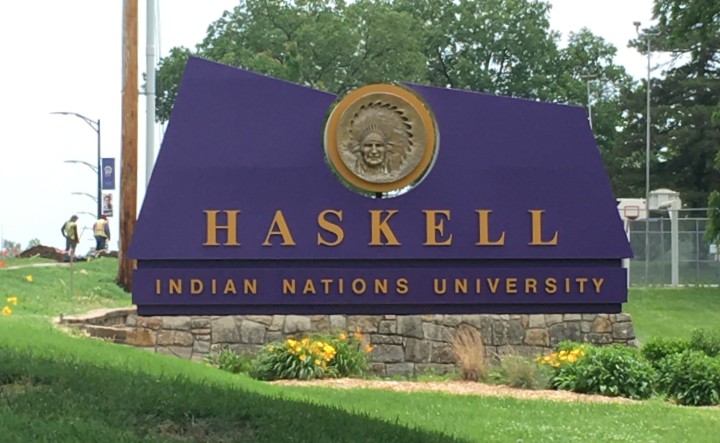
- Details
- By Levi Rickert
Legislation has been introduced in Congress by two Kansas lawmakers that will give the Haskell Board of Regents governance over Haskell Indian Nations University. If enacted, the Bureau of Indian Education (BIE) would be removed from operating the Lawrence, Kansas-based university.
U.S. Sen. Jerry Moran and Rep. Tracey Mann, announced the draft legislation in a news release Monday.
 Make A Donation Here
Make A Donation Here
The legislation comes on the heels a congressional hearing held on July 23, 2024 that was filled with accusations of decades of mismanagement, nepotism, and toxicity at Haskell Indian Nations University.
“The bureau has failed to protect students, respond to my congressional inquiries or meet the basic infrastructure needs of the school,” Moran said in the release. “It is clear that the best path forward is for the university to be led by an independent Board of Regents nominated by the Tribal community and no longer fettered to the Bureau of Indian Education.”
Prairie Band Potawatomi Nation Chairman Joseph Rupnick praised the legislation.
“I am thankful that Sen. Moran and Rep. Mann have introduced this legislation to strengthen Haskell as a federally chartered university to further the federal government’s treaty and trust responsibility to Indian people,” said Joseph Rupnick, Chairman of the Prairie Band Potawatomi Nation. “I look forward to discussions in the new year with Tribal leaders and Haskell alums, faculty and students so that this bill can safeguard Haskell’s future and its funding.”
Sen. Moran and Rep. Mann are seeking feedback from the Native American, Lawrence and higher education communities on the proposed legislation to ensure the bill effectively addresses key issues at Haskell University.
The university was once a Indian boarding school. It opened in 1884 under the name of United States Indian Industrial Training School with an enrollment of 22 Native American students. Within a semester the enrollment grew to 400 Native students from various tribes from various points of the country.
In 1887, the school was renamed for Dudley C. Haskell who fought during the Civil War in the Union Army in Arkansas, Kansas, Missouri and in the Indian Territory. Some 20 years later, Haskell served in Congress as a representative from Kansas. While in Congress, he served as the Commissioner of Indian Affairs for two years. During this time, he supported legislation to establish off-reservation Indian boarding schools in Kansas, Nebraska and in Indian Territory to be modeled after the Carlisle Indian Industrial School. Haskell died unexpectedly in late 1883
In the early 1930s, industrial training became an important part of the school’s curriculum. By 1935, Haskell became known for post high school vocational training. In 1965, Haskell graduated its last high school class.
During the early 1970s, the school began offering a junior college curriculum and was known as Haskell Indian Junior College. 1999, the U.S. Department of the Interior Assistant Secretary for Indian Affairs approved a change in the name, which became the “Haskell Indian Nations University.”
Some notable Native Americans who have attended Haskell are Olympic great Jim Thorpe (Sac & Fox/Potawatomi), Billy Mills (Oglala Sioux Tribe), and Rep. Sharice Davids (Ho-Chunk), a Democrat serving Kansas’ third congressional district.
More Stories Like This
Hanging a Red Dress for Christmas: MMIP, Native Higher Education, and Hope for a Better New YearNative Students Can Win $5,000 Scholarship, International Distribution in Pendleton Design Contest
American Indian College Fund Raises Alarm Over Plan to Shift Native Programs Away From the Dept. of Education
MacKenzie Scott Foundation Gives $5 Million Contribution to Little Priest Tribal College
Tribal Leaders Push Back on Dismantling of U.S. Department of Education
Help us defend tribal sovereignty.
At Native News Online, our mission is rooted in telling the stories that strengthen sovereignty and uplift Indigenous voices — not just at year’s end, but every single day.
Because of your generosity last year, we were able to keep our reporters on the ground in tribal communities, at national gatherings and in the halls of Congress — covering the issues that matter most to Indian Country: sovereignty, culture, education, health and economic opportunity.
That support sustained us through a tough year in 2025. Now, as we look to the year ahead, we need your help right now to ensure warrior journalism remains strong — reporting that defends tribal sovereignty, amplifies Native truth, and holds power accountable.
 The stakes couldn't be higher. Your support keeps Native voices heard, Native stories told and Native sovereignty defended.
The stakes couldn't be higher. Your support keeps Native voices heard, Native stories told and Native sovereignty defended.
Stand with Warrior Journalism today.
Levi Rickert (Potawatomi), Editor & Publisher

